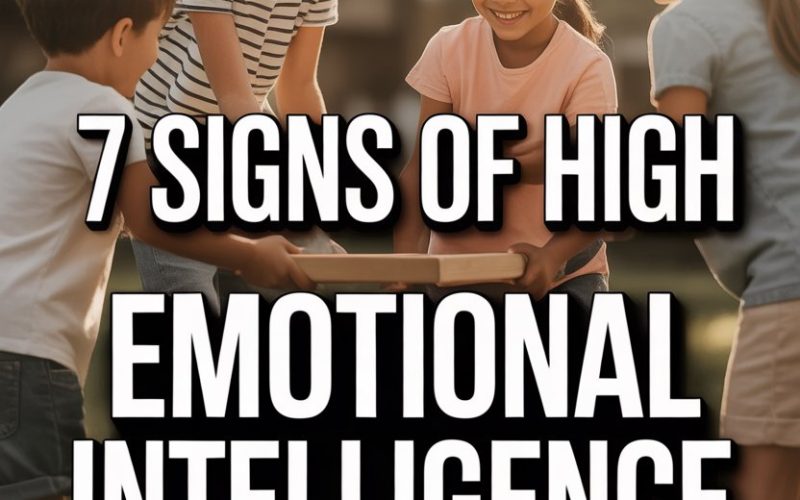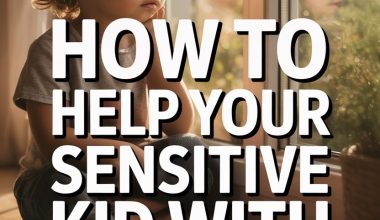Let’s be honest: some days, “emotional intelligence” sounds like a mystical power reserved for Zen monks and toddlers who’ve had their nap.
But beneath the buzzwords and Instagram memes, this skill makes a world of difference for our kids—and those who parent them.
Busy parents barely have time for a proper cup of tea, never mind decoding complex psychology textbooks.
Here’s the good news: you can spot the signs of high emotional intelligence in your child while they’re still wearing superhero pyjamas at dinner.
And you can help develop these super-skills, often with just a tweak to your daily routine.
1. They Recognize and Name Their Feelings
Ever had a child stomp around the kitchen, face like thunder, insisting, “I’M NOT UPSET!”?
Emotionally intelligent kids tend to know how they feel and can label those emotions. According to experts from Pyschology Today, children who can say, “I’m frustrated because I can’t find my shoe!” are already ahead of the curve.
This isn’t about producing a tiny Freud. It’s about helping them connect the dots between what’s happening inside and outside.
At home, try emotion charts, books with expressive characters, or just narrating your own feelings in a mildly theatrical way: “Mum feels a bit frazzled when the house looks like a tornado hit it.”
You might be surprised by how quickly children pick this up.
2. They Show Empathy For Others
The kid who hands their classmate a tissue when they’re crying? That’s empathy in action. And it’s a major pillar of emotional intelligence.
Researchers at Harvard’s Making Caring Common Project found that empathy can be nurtured from a very young age. Children who notice when others are sad, worried, or excited—and respond in a kind way—are flexing their emotional muscles.
Practically speaking, you can encourage this by reading stories with diverse characters, talking about feelings after playdates, or asking, “How do you think Jamie felt when that happened?” (Just don’t force it; empathy grows best when modelled, not demanded.)
3. They Can Self-Soothe and Manage Strong Emotions
No one expects a four-year-old to meditate in lotus position during a tantrum. But kids with high emotional intelligence develop tools for calming themselves, even if it’s just running to their bedroom for a breather.
According to child psychologist Dr. Laura Markham, simple routines like taking deep breaths, counting to ten, or squeezing a favourite soft toy help children learn to self-regulate.
Parents can model this by narrating their own calming techniques (“Mum’s going to make a cup of tea and take three deep breaths before she tackles that laundry mountain”) or by creating a “calm-down corner” stocked with sensory toys, books, and a little privacy.
4. They Handle Disagreements Without Melting Down
Conflict is as much a part of childhood as sticky fingers and lost shoes.
What sets emotionally intelligent children apart is their ability to disagree—sometimes quite passionately—without launching into full-scale war.
Researchers at the University of Cambridge note that children who can negotiate, compromise, or at least pause and listen during arguments are already practising advanced social skills.
At home, you can help by modelling respectful disagreement (no shouting matches over whose turn it is to do the dishes), using “I” statements, and setting basic ground rules for discussions. “We don’t throw blocks; we talk it out.”
It doesn’t always work, but miracles do happen—sometimes after bedtime.
5. They’re Good Listeners
Ever tried explaining the rules of Snakes and Ladders to a child who’s already halfway up the curtains?
Listening is a learned skill, but those with high emotional intelligence often tune in when others speak—especially when feelings are involved.
Experts from rasingchildren.net.au highlights that active listening isn’t just about being quiet; it’s about making eye contact, asking questions, and showing they care about the answer.
Try simple games like “repeat what you heard” or “telephone” to build listening muscles.
During family chats, ask your child their opinion and genuinely listen. You might even discover what happened to the missing chocolate biscuits.
6. They Adapt to Changing Moods and Situations
Life changes faster than the contents of a toddler’s pockets. Children with high emotional intelligence can pivot—sometimes clumsily, often impressively—when routines shift or plans fall apart.
This agility comes from a mix of self-awareness, empathy, and a sprinkle of resilience.
The Encyclopedia on Early Child Development points out that flexibility can be cultivated by gently stretching your child’s comfort zone: a new bedtime routine, an unexpected visitor, or even a missing favourite cup.
At home, you can acknowledge when things change (“We were going to the park, but now it’s pouring with rain—how do you feel about that?”). Offer choices, where possible, to help them feel some control.
And remind yourself: sometimes a biscuit does make all the difference.
7. They Can Apologize and Make Amends
“I’m sorry” is more than just a magic phrase your child blurts out when an adult is glaring. Emotionally intelligent kids understand what went wrong, feel the impact, and want to repair the relationship.
According to a parenting expert from Today’s Parent, genuine apologies don’t just smooth things over—they teach accountability, empathy, and respect.
At home, avoid forcing an apology on the spot. Instead, ask questions to help them reflect: “How do you think your friend felt when that happened?” or “What could you do to make things better?”
You’ll know it’s working when your child offers a spontaneous hug (or, more realistically, gives back the toy they snatched).
Raising Emotionally Intelligent Kids in a Wild World
Spotting these signs doesn’t mean your child is about to lead mindfulness sessions at nursery. But noticing even a few is proof that you’re on the right track—and so are they.
Keep narrating your own feelings, modelling calm responses, and making room for your child’s giant emotions. The world’s wild, but emotionally intelligent kids have an extra toolkit to weather it.
And if all else fails, there’s always chocolate. Or a nap. Or both.




